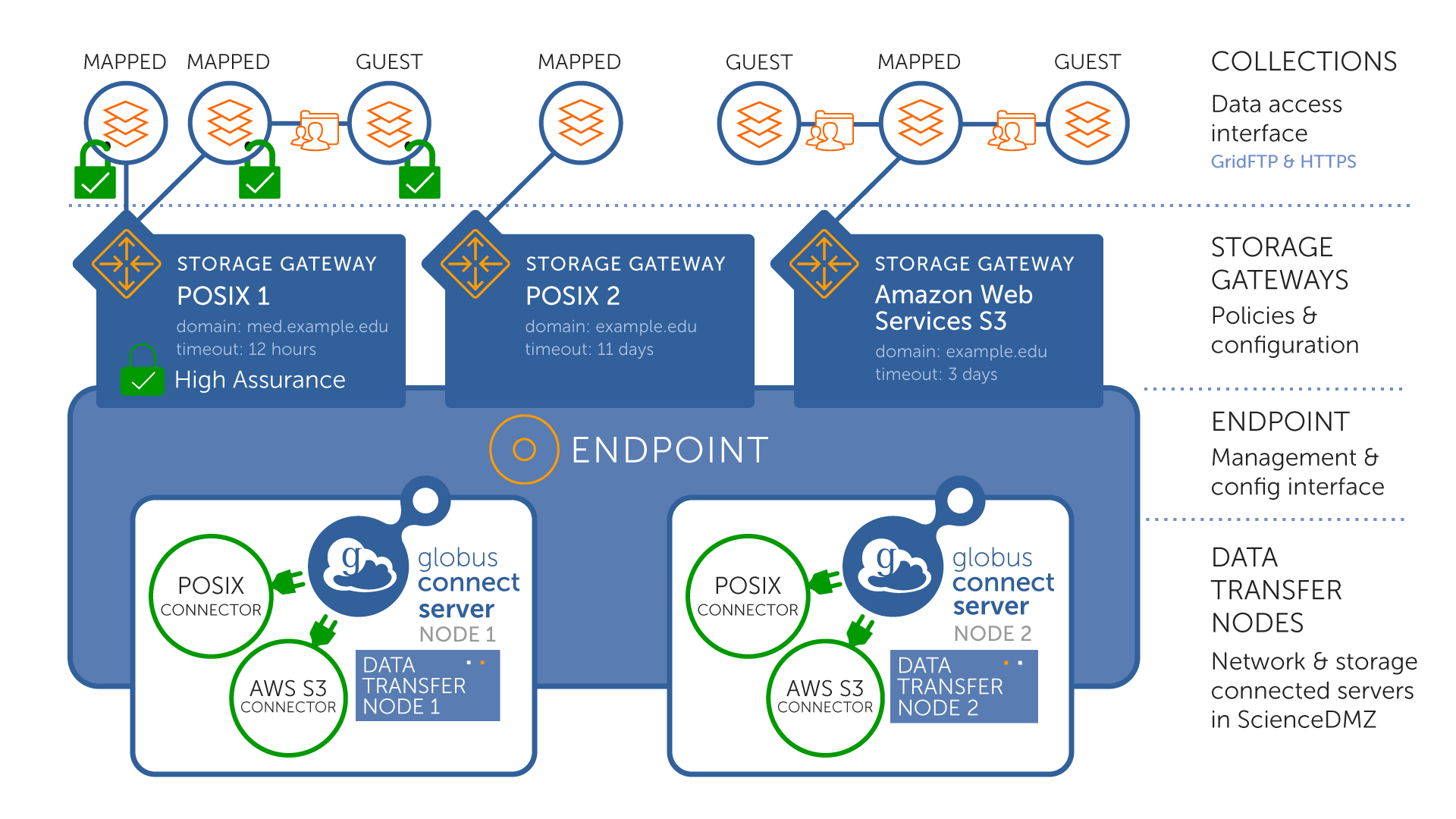Collections and Endpoints
Within the Globus ecosystem, Endpoints and Collections are key, closely related entities.
An Endpoint represents a specific server or cluster of servers.
A Collection represents a location containing data plus the policies and permissions for accessing that data.
If you use it for data transfer as a user, it’s a Collection. Endpoints cannot be used to list or transfer files directly!
Visual Aid for Globus Connect Server
This schematic diagram shows the relationships between endpoints, nodes, storage gateways, and collections. It is useful to refer back to in the discussion below.
The endpoint provides storage gateways, and mapped collections are always defined in terms of those gateways. Each node in the endpoint is responsible for running the storage connectors and for mapping the storage gateway objects to the appropriate storage system.

This is specific to Globus Connect Server. Globus Connect Personal has a simplified model with fewer distinct entities.
Endpoint
An Endpoint refers to a Globus Connect Server installation.
Globus Connect Server may be installed only on one server or on a cluster. The individual servers are called nodes, but the whole cluster is the Endpoint.
Endpoints support management capabilities for mapping Globus Identities to local users or credentials for external storage, for configuring and managing storage adapters called Storage Gateways.
Storage Gateways
Storage Gateways are objects created and managed on Endpoints which provide an interface for managing access to different storage systems.
There are gateway types for POSIX filesystems, S3, Google Drive, and other services. For full details, see the Premium Storage Connectors documentation.
A "storage connector" is a subsystem of Globus Connect Server which provides the ability to interface with a storage system.
Storage Gateways are entities created on Endpoints by administrators in order to manage and configure settings for the underlying connector.
Collection
A Collection is always one of two types:
-
Mapped Collection
-
Guest Collection
Mapped Collection
A Mapped Collection is a point of access to a storage system which uses the credentials of the currently logged-in user. That user is "mapped" to some underlying credential or access mechanism.
For example, the user globus@globus.org may be mapped to globus local user
on a POSIX storage system.
Or perhaps globus@globus.org is mapped to an API key for accessing a cloud
storage system like Google Drive.
Both cases are types of Mapped Collections — the current user is being
associated with some underlying credential or access mechanism.
We specify that it is the "current user" in contrast with Guest Collections, described below. Guest Collections allow a user to share their data with other users.
Mapped Collections with Globus Connect Personal
Globus Connect Personal directly connects your personal computer to the Globus ecosystem as a Mapped Collection.
In this case there is no Endpoint.
In the past, the Globus Connect Personal client was referred to as the Endpoint. Older documentation and applications outside of Globus may still use this term.
This aligned with the terminology used under past versions of Globus Connect Server, in which the Endpoint and Mapped Collection were combined into a single entity.
Guest Collection
A Guest Collection is a point of access to a storage system which is hosted on a Mapped Collection, and which uses the credentials or access of the user who created it.
Guest Collections are used to share data with other users.
The user who creates the Guest Collection gets to set permissions on it determining which other users are allowed to use it. These users are the "guests" of the Guest Collection.
Recap
-
An Endpoint is a server or cluster of servers which provide access to storage.
-
A Mapped Collection is a single user’s access to an Endpoint.
-
A Guest Collection is a share-point on a Mapped Collection.
-
Globus Connect Personal provides a Mapped Collection while Globus Connect Server provides an Endpoint.